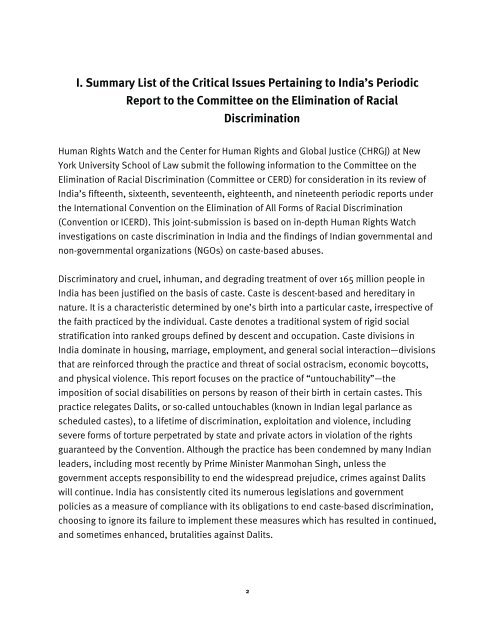Caste Discrimination against India's âUntouchablesâ - Human Rights ...
Caste Discrimination against India's âUntouchablesâ - Human Rights ...
Caste Discrimination against India's âUntouchablesâ - Human Rights ...
Create successful ePaper yourself
Turn your PDF publications into a flip-book with our unique Google optimized e-Paper software.
I. Summary List of the Critical Issues Pertaining to India’s Periodic<br />
Report to the Committee on the Elimination of Racial<br />
<strong>Discrimination</strong><br />
<strong>Human</strong> <strong>Rights</strong> Watch and the Center for <strong>Human</strong> <strong>Rights</strong> and Global Justice (CHRGJ) at New<br />
York University School of Law submit the following information to the Committee on the<br />
Elimination of Racial <strong>Discrimination</strong> (Committee or CERD) for consideration in its review of<br />
India’s fifteenth, sixteenth, seventeenth, eighteenth, and nineteenth periodic reports under<br />
the International Convention on the Elimination of All Forms of Racial <strong>Discrimination</strong><br />
(Convention or ICERD). This joint-submission is based on in-depth <strong>Human</strong> <strong>Rights</strong> Watch<br />
investigations on caste discrimination in India and the findings of Indian governmental and<br />
non-governmental organizations (NGOs) on caste-based abuses.<br />
Discriminatory and cruel, inhuman, and degrading treatment of over 165 million people in<br />
India has been justified on the basis of caste. <strong>Caste</strong> is descent-based and hereditary in<br />
nature. It is a characteristic determined by one’s birth into a particular caste, irrespective of<br />
the faith practiced by the individual. <strong>Caste</strong> denotes a traditional system of rigid social<br />
stratification into ranked groups defined by descent and occupation. <strong>Caste</strong> divisions in<br />
India dominate in housing, marriage, employment, and general social interaction—divisions<br />
that are reinforced through the practice and threat of social ostracism, economic boycotts,<br />
and physical violence. This report focuses on the practice of “untouchability”—the<br />
imposition of social disabilities on persons by reason of their birth in certain castes. This<br />
practice relegates Dalits, or so-called untouchables (known in Indian legal parlance as<br />
scheduled castes), to a lifetime of discrimination, exploitation and violence, including<br />
severe forms of torture perpetrated by state and private actors in violation of the rights<br />
guaranteed by the Convention. Although the practice has been condemned by many Indian<br />
leaders, including most recently by Prime Minister Manmohan Singh, unless the<br />
government accepts responsibility to end the widespread prejudice, crimes <strong>against</strong> Dalits<br />
will continue. India has consistently cited its numerous legislations and government<br />
policies as a measure of compliance with its obligations to end caste-based discrimination,<br />
choosing to ignore its failure to implement these measures which has resulted in continued,<br />
and sometimes enhanced, brutalities <strong>against</strong> Dalits.<br />
2

















